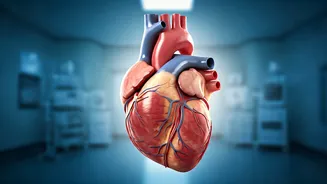Air Pollution's Threat
Air pollution, characterized by high levels of airborne toxins, poses a significant threat to cardiovascular health. Specifically, fine particulate matter
known as PM2.5, can cause inflammation within the arteries, ultimately leading to an increase in blood pressure. The cumulative effect of long-term exposure to these pollutants raises the risk of plaque accumulation, which can cause heart attacks, especially in metropolitan regions where pollution levels tend to be high. It is worth noting the dangers associated with frequent exposure to the air, which can be dangerous, depending on its levels.
Medications and Stimulants
Certain medications and stimulants have the potential to disrupt normal heart function. For example, some common cold medicines, energy drinks, and other stimulants can elevate both blood pressure and heart rate. This can, in turn, increase the risk of triggering cardiac issues, particularly when these substances are overused. Furthermore, the combination of stimulants with alcohol can compound these effects, putting an individual at a heightened risk for heart attack.
Extreme Weather Impact
Weather conditions can greatly affect the cardiovascular system. Both hot and cold temperatures impose strains on the heart. In the case of cold weather, arteries constrict, leading to an increase in blood pressure. Conversely, extreme heat can lead to dehydration and place additional stress on the heart. Both scenarios may trigger cardiac episodes, underlining the importance of being aware of the environment, especially when it is a serious issue that concerns the heart, and how it is impacted.
Heavy Meals & Overeating
Consuming large meals or indulging in binge eating can place excessive demands on the heart. Overeating and excessive alcohol intake can lead to a sudden surge in blood pressure and elevated levels of fats in the bloodstream. This surge causes the heart to work harder right after meals. The effect is that overworking can potentially lead to an increased risk of heart attacks. This highlights the importance of moderation in dietary habits.
Infections and Inflammation
Various infections can instigate inflammation within the heart muscle, a condition known as myocarditis. Notably, illnesses like the flu, COVID-19, and other infections can directly impact the heart, significantly increasing the risk of heart attacks or strokes, particularly among vulnerable populations. Understanding the potential cardiac complications associated with these infections underscores the importance of prompt medical attention and preventive measures.
Intense Physical Strain
Engaging in high-intensity physical workouts without adequate preparation poses a risk. Jumping into intense exercise regimes without proper conditioning can instigate disruptions in heart rhythm or, in certain cases, trigger blockages. Individuals with existing heart risks should take care, as they are especially vulnerable to the effects of sudden, strenuous physical exertion. Therefore, it's essential to gradually increase exercise intensity and seek medical advice.
Sleep Deprivation Danger
Insufficient or poor-quality sleep has been linked to increased levels of stress hormones, particularly cortisol. The increase in cortisol, along with the consistent elevation of blood pressure, places continuous strain on the heart over time. This chronic stress can make an individual more prone to heart attacks. Prioritizing adequate sleep is a crucial step towards maintaining cardiovascular health.
Sudden Emotional Stress
Sudden emotional distress can have a detrimental effect on the heart. Overwhelming stress can trigger a cascade of physiological responses, including increased heart rate and blood pressure, potentially increasing the risk of a heart attack. Managing stress through various coping mechanisms and strategies is critical to safeguarding heart health. Recognize the warning signs of emotional distress and seek support when needed.














